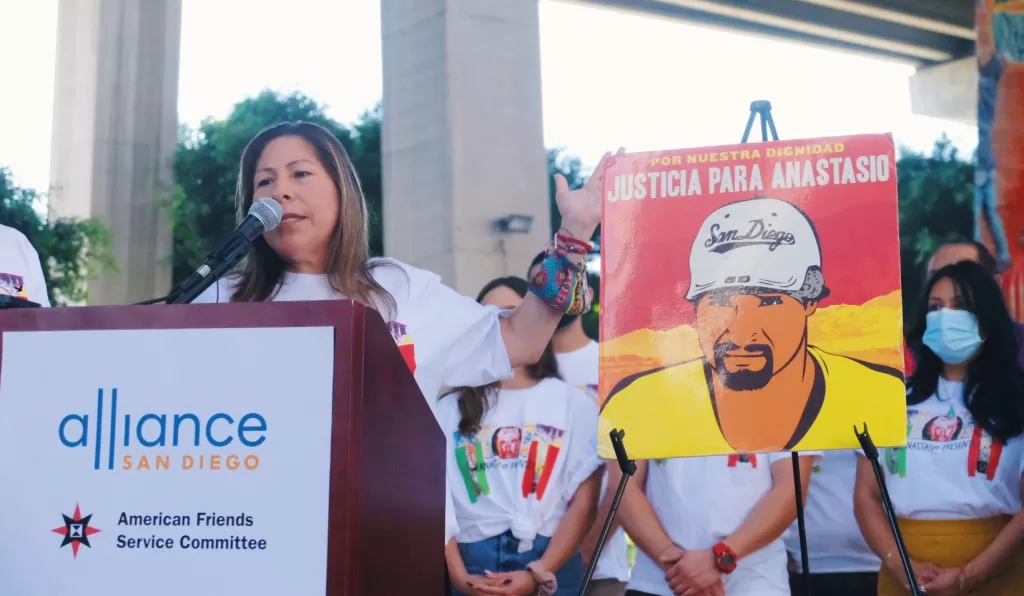
Editor’s note: The following was compiled from a press release issued by Alliance San Diego and UC Berkeley’s International Human Rights Law Clinic. See more at this link.
On the night of May 28, 2010, in front of dozens of eyewitnesses at the San Ysidro, California, Port of Entry on the U.S.-Mexico border, at least eight U.S. border agents punched, kicked, dragged, tased, hogtied, and kneeled on the neck and body of Anastasio Hernández Rojas while he cried out for help and then stopped breathing as another nine agents stood by. The Mexican Government official who witnessed the incident stated that the U.S. border agents treated Anastasio “like an animal.” Anastasio died after several days in the hospital.
Although Anastasio’s death was ruled a homicide, U.S. federal prosecutors eventually closed the investigation without pursuing criminal charges. Unable to get justice from the U.S. system, Anastasio’s family took their case to an international body, the Inter-American Commission on Human Rights (IACHR). This is the first case involving an extrajudicial killing by U.S. law enforcement to be examined by an international human rights body.
On Nov. 4, 2022, the IACHR heard arguments and testimony in the landmark case (Family Members of Anastasio Hernandez Rojas vs. United States) about systemic abuse and impunity in the nation’s largest law enforcement agency, U.S. Customs and Border Protection (CBP). On Feb. 14, 2023, Anastasio’s family submitted their final arguments to the IACHR before the commission makes a decision. The IACHR had given the family and the Government until Feb. 14, 2023, to submit final observations regarding the November 2022 hearing.
In their Feb. 14 submission, the family asserts that what happened to Anastasio should never happen to any human being. At the hearing last November, the United States did not contest the facts presented by the family, did not offer any evidence of its own, and failed to address the specific, serious, and grave violations of the American Declaration on the Rights and Duties of Man, which include, among other violations:
1. Torturing Anastasio and arbitrarily depriving him of his life;
2. Failing to conduct an exhaustive, timely, independent, and impartial investigation;
3. Failing to prosecute and punish those responsible;
4. Failing to provide the full, complete, and public truth about the killing; and
5. Applying laws and policies on use of force that do not adhere to the international human rights standard of necessary and proportionate.
Instead, the United States repeated its argument that the case was not admissible for review, despite the IACHR ruling otherwise in 2020. The Government defended the fabricated narrative of border agents that Anastasio was combative in order to justify their actions, despite overwhelming evidence to the contrary. Additionally, the Government asserted that they had conducted a “thorough” and “comprehensive” investigation, despite the fact that the investigation by the San Diego Police Department was never reopened after new and damning video evidence emerged. Nor was it reexamined after recent revelations that Border Patrol was running cover-up units called Critical Incident Teams (CITs), which interfered with the police investigation in this case.
Although the U.S. Customs and Border Protection (CBP) disbanded CITs in 2022, after their existence was made public and Congress initiated investigations, the agency never addressed the harm done in Anastasio’s case or any other. More notably, all of the oversight bodies that the United States suggested to IACHR are independent and impartial, including the Office of Inspector General (OIG), Office of Professional Responsibility (OPR), and National Use of Force Review Boards (NUFRBs), have all relied on evidence collected by the now discredited CITs, calling into question every investigation they ever conducted. Of ongoing concern is the fact that Border Patrol management teams are still involved in investigations, compromising their integrity.
The United States also asserted that changes to its use of force policy since Anastasio’s death are sufficient to address the family’s concerns about the repetition of harm. But none of the limited reforms changes the use of force standard. None of them limit the use to necessary and proportionate force. None of them have prevented the death of more than 250 women, children, and men in encounters with border agents since Anastasio was killed. None of them have led to any more accountability. Most damningly, CBP was engaged in a record high number of use of force incidents last year, with over 900 incidents, which included those leading to death and serious injury.
Anastasio’s family now asks the IACHR to accept the uncontested facts in this case, find that the United States has violated its obligations under the American Declaration on the Rights and Duties of Man, and direct the United States to answer the prayers of the family, including:
1. Reopen the investigation of Anastasio’s death and the obstruction that followed;
2. Disclose publicly all official records related to prior investigations;
3. Publicly acknowledge and apologize for killing Anastasio; and
4. Enact policy reforms to prevent the repetition of harm on other families by, among other things, changing the use of force standard to necessary and proportionate.
Maria Puga, Anastasio’s widow and the petitioner in this case said:
I have stayed up many nights grieving Anastasio’s death. I struggle to move past the image of agents brutally beating Anastasio. I cannot understand how agents took my husband’s life without consequence or even a simple apology. They tortured my husband in public. If government agents could do this in front of dozens of witnesses, I can’t help but think: what are they doing to migrants behind closed doors? I will not be at peace until I achieve justice for my husband. The petition before the Inter-American Commission gives me hope for true justice, an opportunity to create lasting change.

Roxanna Altholz, Co-Director of the International Human Rights Law Clinic at UC Berkeley and attorney in the Anastasio case said:
Anastasio’s case is the first opportunity for the Inter-American Commission on Human Rights to assess use of force law in the United States. Their review comes at a time when the nation is reckoning with entrenched abuse and impunity in law enforcement, including at U.S. Customs and Border Protection, the country’s largest law enforcement agency. This landmark case provides the Commission with the chance to not only deliver long sought justice to Anastasio’s family, but also align U.S. use of force standards with international human rights standards and obligations.
Andrea Guerrero, Executive Director of Alliance San Diego and attorney in the Anastasio case said:
Every day, an average of three people are killed by local, state, and federal law enforcement in the United States. More people were killed last year than in any of the years since Anastasio was killed. Only a handful of local and state law enforcement officers have ever been convicted, and never in the last 100 years has a border agent been convicted for a killing, including in Anastasio’s case. This is because the standard for use of force is so low in the United States, does not conform with the human rights standard of necessary and proportionate, and violates our international obligations. In its upcoming decision in the Anastasio case, the Inter-American Commission on Human Rights could help change that.
If cases like George Floyd opened peoples minds to law enforcement reforms, the case of Anastasio could open the door to changing the use of force standard that has enabled abuse and impunity for far too long. It would change the question from “Was the force objectively reasonable?” to “Was the force necessary and proportionate?” Changing the question will save lives. It will have a cascading effect, changing the expectations, the training, the evaluation, and the accountability. We know that Anastasio did not die in vain. This case and the change it portends is his legacy.
